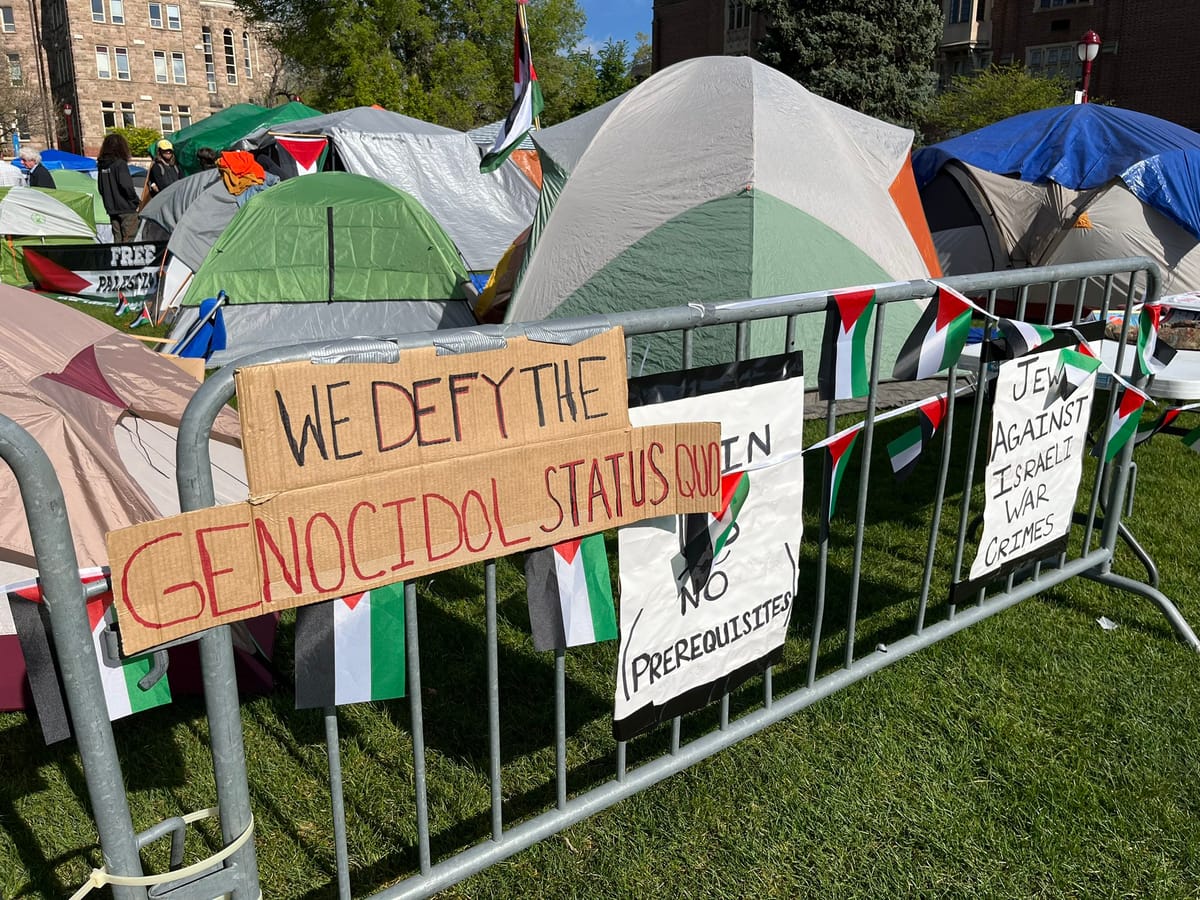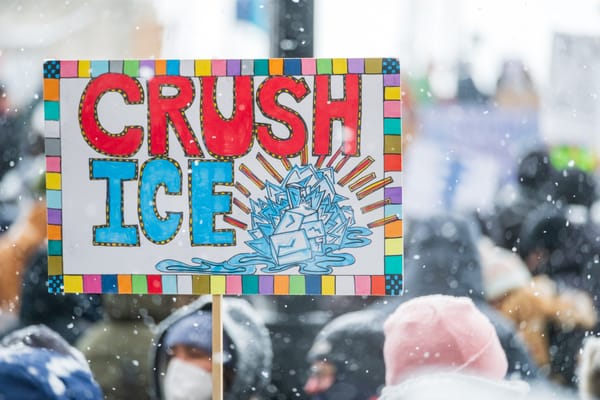Eman Abdelhadi: "We Have to be Impossible to Ignore"

The current wave of student-led Palestine solidarity protests has reached an inflection point, as organizers at some remaining encampments say they are bracing for police raids. In Chicago, the DePaul Divestment Coalition, which organized an encampment on the DePaul University campus, has announced that administrators have declared a “stalemate,” effectively ending negotiations with student protesters. The DePaul encampment is the only remaining student-led encampment in the Chicago area, following raids on protest sites at the University of Chicago and the School of the Art Institute of Chicago. Student organizers at DePaul say they will continue to uphold their demands. Henna Ayesh, a Palestinian student and a member of the DePaul Divestment Coalition, said in a statement, “I don’t want my tuition money to be invested in my family’s suffering.” With the end of the school year looming, students at schools where raids have already occurred are grappling with questions about what comes next.
Nearly 2,900 people have been arrested at student-led Palestine solidarity protests across the US, including dozens of professors. The campus protests have spread internationally, with new encampments appearing across Europe and at major universities in Canada. Some students in the US protested during their graduation commencement ceremonies last week despite threats of legal action. As the school year ends in the US, activists are working to carry forward the momentum of the campus protests with new waves of organizing. As Palestinian academic, author, and organizer Eman Abdelhadi told me over the weekend, “This moment is urgent. We are fighting for the lives of people on the brink of death either by bombs or starvation.” Abdelhadi stressed the importance of political interventions within the US, given that the crisis in Palestine is “a disaster that is entirely man-made and American fueled.”
For Palestinians in Gaza, the situation is dire. Heavy airstrikes have been reported across the Gaza Strip in recent days. Palestinians have been forced to flee Jabalia, Beit Lahiya and Rafah, as Israeli forces reinvade heavily hit areas. Last week, as images of Palestinian children crushed by Israeli bombs in Rafah circulated on social media, CNN published a story describing the torturous conditions experienced by Palestinians in an Israeli detention center in the Negev desert. The network reported:
[Israeli whistleblowers] paint a picture of a facility where doctors sometimes amputated prisoners’ limbs due to injuries sustained from constant handcuffing; of medical procedures sometimes performed by underqualified medics earning it a reputation for being “a paradise for interns”; and where the air is filled with the smell of neglected wounds left to rot.
Over 35,000 Palestinians have been killed by Israeli forces since October 7.
I spoke recently with Ahmad Abuznaid, the Executive Director US Campaign for Palestinian Rights, who described the strain Palestinian organizers in the US are facing. For more than seven months, Abuznaid’s team of “Palestinians and people with a deep commitment to Palestine” have been responding to the ongoing genocide in Gaza. “Sometimes we have to remind ourselves it’s a marathon, and that we have to rest,” he said. “Then we get up the next morning and fight like hell again to end all US support of this genocide.” Abuznaid expressed gratitude for the ongoing protests that students and other community members have organized. “I'm thankful that we aren't alone,” he said. “Every day, our movement grows.”
Abdelhadi emphasized that the student-led protests have been transformative for students and their supporters. In the wake of a campus police raid, which destroyed the student-led encampment at the University of Chicago (UChicago), where Abdelhadi is a faculty member, she tweeted, “For many of us, these past 8 days were a glimpse into a different kind of life. One where we are truly connected to each other, where we share space as human beings not just as positions (student, professor, etc). That feeling is bigger than a tent, and it will guide us forward.”
When Abdelhadi and I spoke, she talked about the expansive politics of the young people who had created the UChicago encampment. “I think young people are rejecting the single-issue or single-campaign model of organizing that has been forced on us since the 80s,” she said. “This generation sees that all their oppressions are interconnected.” Abdelhadi pointed to the demands of the UChicago students, who demanded the university divest from Israeli apartheid while also demanding “repair for the South Side.” UChicago has long been criticized by students and community members as a gentrifying force on Chicago’s South Side. “The students can see that the same logics that displace Palestinians to satisfy Israeli ambitions are at work in displacing Black people from their neighborhood to satisfy UChicago's ambitions,” Abdelhadi said. “Young people are refusing to be siloed into political tunnels and are instead creating revolutionary spaces.”
Abuznaid also spoke highly of student protesters. “These students are committed, they are brave, and they will not be deterred,” he said. “When I spent time at the encampment at Columbia, it was clear to me how organized, intentional, and visionary these students are. Their demands are clear, despite what some media or administrators would have us believe.” Abuznaid said that officials have “demonized” students with “frivolous character assassinations” in an effort to stifle the momentum of the Palestine solidarity movement. “The encampments have been made up of students of every race, faith, and academic background,” he said. “They are representative of a wave that is here to stay, and that is scary to both the fascists and the neoliberals.”
Students whose encampments had been dismantled played a key role in a protest outside a fundraiser for Joe Biden in downtown Chicago last week. As the president rallied donors at the Palmer House hotel, Palestine solidarity protesters rallied outside, chanting, “Hey Biden, what do you say? How many kids did you kill today?”
“Biden so easily and clearly encapsulates the evils of the ruling class, and the irrelevance of their supposed political ideologies,” Abdelhadi said. “Here is a ‘liberal’ president that has defended, fueled, and funded genocide at every turn, even as his base has screamed their dissent.” Abdelhadi stressed Biden’s culpability for the ongoing genocide in Gaza. “I hold him equally responsible for every Palestinian life lost,” she said. “Materially, he has been essential to Israel's campaign of terror, and rhetorically he quickly slipped into racist tropes to justify his stance,” Abdelhadi said. Biden’s recent comment that Hamas, an organization that was founded in 1987, was motivated by “ancient desires” to kill Jewish people drew widespread condemnations from activists. “He is mimicking the Bush era line that ‘Sunnis and Shias have been fighting each other since time immemorial,’” Abdelhadi said. “It's a rhetorical move that deftly denies any recent history and lets the US and its allies off the hook for the destruction they have wreaked across the region.”
Abuznaid also criticized Biden, dismissing the president’s posturing about the invasion of Rafah as inadequate and out of touch with the severity of the situation. “The Israeli invasion of Rafah is underway and horrific,” he said. “The Israelis have enough weapons to continue to commit genocide, and they have said they will continue the operation regardless of what the US says,” Abuznaid said.
The Biden administration has recently stated that Israel may have violated international law by failing to account for the safety of civilians during the country’s attacks on Gaza. In response to the Biden administration’s threats to restrict military aid, Israeli Prime Minister Benjamin Netanyahu stated, “If we need to, we will fight with our fingernails. But we have much more than fingernails.”
Abuznaid condemned Biden’s unwillingness to challenge Israel’s violence meaningfully. “President Biden will support invading US college campuses before he stands up to Israel,” he said. “He continues to utter racist tropes informed by his zionist beliefs. Because of his devout Zionism, he is unable to see Palestinians as a people who have been facing a catastrophe for more than 75 years.”
As the destruction in Gaza continues, Abuznaid underlined the need for political action. “We can’t get caught up with mainstream media or Biden's ‘red lines,’” he said. “We need to go all out to end this genocide now.” Abuznaid stressed the importance of engaging with local organizations and grassroots organizing. “We as a people need to continue to boycott, advocate, protest, engage in civil disobedience, and demand divestment.”
Abdelhadi echoed that call. “We cannot allow business as usual to continue,” she said. “We have to become a thorn in the side of every institution that supports this genocide. We have to make the status quo costly–or even impossible–to maintain. We have to act now, and we have to be impossible to ignore.”




